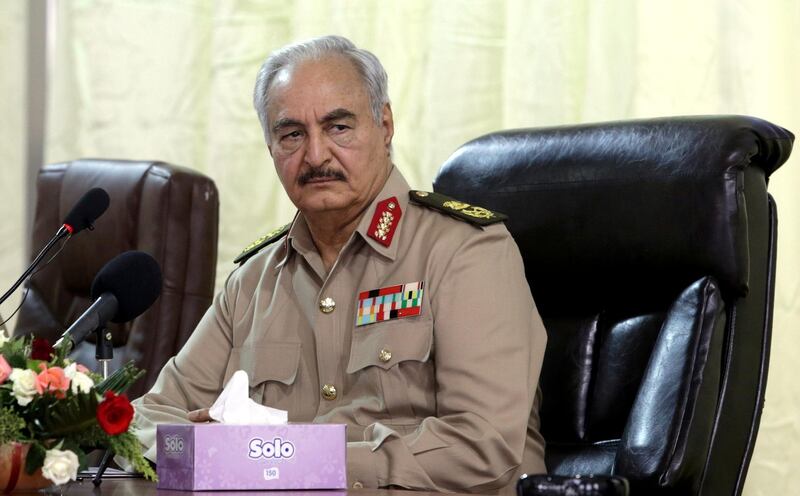Libyan military commander Khalifa Haftar may not attend a peace conference in Italy on Monday, undermining the latest attempt by the international community to settle nearly nine years of strife in the North African country.
Sources from Field Marshal Haftar’s Libyan National Army (LNA), which controls eastern parts of the country, told Italian news agency Ansa that he would boycott the international conference on Libya in the Sicilian capital of Palermo.
While the Italian government maintained that Mr Haftar would attend there were rumours Italian prime Minister Giuseppe Conte travelled to Libya to convince Mr Haftar to attend.
An official in the LNA told The National the head of Italian intelligence met with Mr Haftar on Saturday to try to make him attend but failed. The LNA official further stated that he was not aware Mr Conte was in Libya, but said it was unlikely Mr Haftar would travel to Palermo for the conference.
The LNA sources told Ansa that their commander would boycott the summit in protest over the attendance of representatives from Qatar, which the LNA has accused of sponsoring terrorism in oil-producing areas of the country.
They said Mr Haftar was also opposed to the presence of Al Qaeda-linked groups, without naming a specific delegation.
Libya has had a leadership vacuum since the 2011 revolution that led to the overthrow and death of Muammar Qaddafi. Militias, a UN-backed government, the remnants of the General National Congress and the LNA commander are just some of the actors vying for control. With violence, corruption and a huge refugee population passing through on the way to Europe, Libya’s problems need lasting political solutions.
The summit on Monday, organised in collaboration with the United Nations Support Mission in Libya (UNSMIL), had raised hopes of progress towards achieving peace and stability.
“The goal of the event ... is to provide a tangible contribution to the stabilisation process of the country, in full agreement with the main Libyan political actors,” the Italian government said on its website.
With a slick social media presence and a dedicated hashtag, #ForLibyaWithLibya, the Italian government’s PR team is set to go, but whether meaningful progress will be made is in question.
On 12th and 13th November, Italy will host a Conference for Libya in Palermo, Sicily. All related information and updates will be available at https://t.co/5lUQiabwOk and by following the hashtag #ForLibyaWithLibya pic.twitter.com/KGJtbrs3Cf
— Palazzo_Chigi (@Palazzo_Chigi) November 9, 2018
In May, Mr Haftar and three other top Libyan leaders agreed in Paris to hold parliamentary and presidential elections in December.
The other three leaders - Fayez Serraj, the head of the UN-backed Government of National Accord in Tripoli; Ageela Saleh, leader of the Libyan House of Representatives; and Khaled Meshri, head of the State Council, an advisory body to the GNA - have confirmed their participation at the Palermo conference.
It is not yet clear which other Libyan figures will attend but there has been anger that some Qaddafi-era officials were invited, including Abdel Rahman Shalgam, who served as foreign minister from 2000-2009.
Of the non-Libyan players at the conference, perhaps the most important are Italy, the host and former colonial ruler, and France, who have been at loggerheads over a solution to the conflict.
If the two nations can end their competition for influence over the country and join with UN special envoy Ghassan Salame and other nations in encouraging Libyan players to find a solution, the Palermo talks may yet bear fruit.
Italian hopes for a successful outcome in Palermo received a boost from reports last week that the French push for presidential elections in December had been shelved, making way for Italy’s preferred slow and steady approach, which favours security over rushed elections.
Italy was never fully supportive of President Emmanuel Macron’s rather optimistic push for elections by the end of 2018 and has accused France of helping to fuel the migration crisis that has overwhelmed the southern European country.
Italian foreign minister Enzo Moavero Milanesi said last month that he was not expecting the conference to produce a date for elections. “No deadlines will be imposed or tasks set for the Libyans,” he said.
Security is high on the agenda for the Libyan attendees and the international community, following August fighting between rival militias in Tripoli which killed 117, displaced thousands and prompted the UN-backed government to declare a state of emergency before a ceasefire was agreed on September 5.
While some may have high hopes for the two-day Palermo conference, it is just the latest of many initiatives that have sought to bridge the gaps between Libya’s many factions, and observers hold little hope it will achieve tangible benefits.
“As of today, it doesn’t look like it could produce a different result from the others [summits],” said Karim Mezran, senior fellow at the Atlantic Council's Rafik Hariri Center for the Middle East.
“It is still unclear at what level the various countries will be represented and this is also an important point," he said. "The higher the level, the more solid the commitment.”
Although the invitation list contained some big international names, it would be surprising if leaders such as Russian President Vladimir Putin or US President Donald Trump, despite being in Paris this weekend, turned up.





